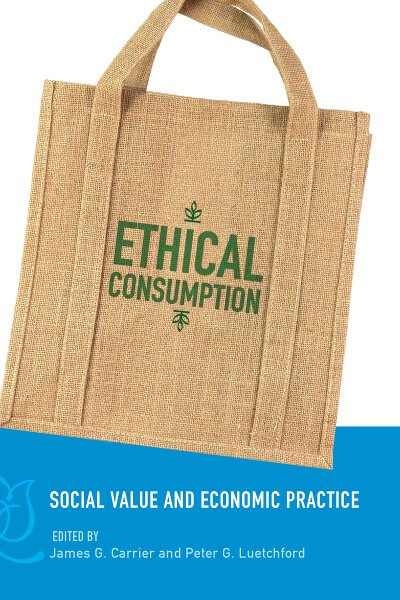 As consumers, are we changing the world with our buying power? This question, which has garnered much attention in recent years, is merely the tip of the iceberg of issues discussed in Ethical Consumption: Social Value and Economic Practice, which is now available in paperback. Following, editors James Carrier and Peter Luetchford explain the purpose behind their volume and delve deeper into the mentality behind “ethical consumption.”
As consumers, are we changing the world with our buying power? This question, which has garnered much attention in recent years, is merely the tip of the iceberg of issues discussed in Ethical Consumption: Social Value and Economic Practice, which is now available in paperback. Following, editors James Carrier and Peter Luetchford explain the purpose behind their volume and delve deeper into the mentality behind “ethical consumption.”
_____________________
This volume arose from our common interest in the ways that ethical consumption is understood, both those seeking to analyse it and by those seeking to pursue it.
Much of the scholarly work on ethical consumption resembles much of the work done on consumption generally in the past decade or two. While the orientations of ordinary and ethical consumers may differ somewhat, both groups produce and reproduce themselves and their worlds through their consumption practices. This general approach is helpful, but we thought that it ignored some important questions.
One of these is that this approach tends to take the values of ethical consumers pretty much for granted. Those consumers commonly are said to value trade justice and the environment, but these concepts are vague. So, we thought it would be important to consider just what kinds of moral ideas and worlds people seek to reproduce through their ethical consumption. As shown in the case studies in this volume, what ethical consumers actually seem to value ranges from the fairly expected, and comfortable, rejection of industrial agriculture to the less comfortable intense nationalistic desire for the local.
Another important question that the general approach to ethical consumption tends to ignore arises from its focus on what those consumers think they are doing. That question is the degree to which ethical consumption is a realistic way of bringing about the change in the world that many ethical consumers say that they want. This has two aspects.
The first concerns ethical consumers themselves. If they seek to affect the world through their purchases and consumption practices, then we need to consider how accurately they perceive that world. It may be that some ethical consumers do see the world fairly clearly, but different papers in this volume show that ethical consumers often see their world in partial ways. For a range of products, it is very difficult for people to discover their trade-justice and environmental implications; for other products, the common assumptions that people make about how things are produced and traded are wildly off the mark.
The second aspect concerns the relationship between ethical consumers and the system in which they exist. Many of those consumers object to what they see as the implacable market rationality of large-scale firms, but they rely on the market itself as the way to bring about change. This can have unfortunate consequences when ethical consumption becomes popular, for it easily turns into an avenue for business to generate new lines of commerce and increase profits. This can happen when companies manipulate the certification systems on which many ethical consumers rely, as it can happen when they advertise their wares in ways that endow them with an aura of being ethical. In both cases, consumers have only a distorted image of the actual ways that objects are produced and traded.
We have described some of the questions that we had in mind when we started the project that resulted in Ethical Consumption: Social Value and Economic Practice, questions that are addressed in different ways by the contributors’ chapters. Together, they make the practices of ethical consumption appear more diverse than they may seem at first glance, and show that such consumption is no straightforward way for people to shape the world around them through their purchasing and consumption. We hope that the volume will stimulate those whose interest in ethical consumption is academic, as we hope that it will lead those who value ethical consumption to consider once again how they might achieve the goals that they espouse.
__________________________________
James G. Carrier is a Hon. Research Associate at Oxford Brookes University and Adjunct Professor of Anthropology at the University of Indiana. He has taught anthropology and sociology, and carried out research, in Papua New Guinea, the United States and the United Kingdom, as well as studying environmental conservation in Jamaica. His publications include Gifts and Commodities (Routledge 1995), Meanings of the Market (ed., Berg 1997) and Virtualism, Governance and Practice (co-ed. with West, Berghahn 2009).
Peter G. Luetchford is Senior Lecturer in Anthropology at the University of Sussex and has carried out field research in Costa Rica and Spain. He has published on ethics and the economy, including Fair Trade and a Global Commodity: Coffee in Costa Rica (Pluto Press, 2008) and he is co-editor of Hidden Hands in the Market: Ethnographies of Fair Trade, Ethical Consumption and Corporate Social Responsibility (Research in Economic Anthropology 2008).
